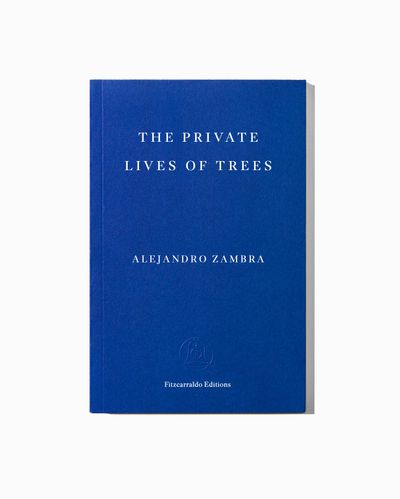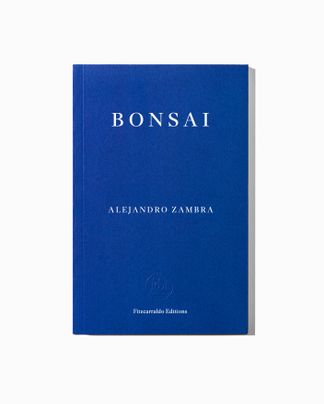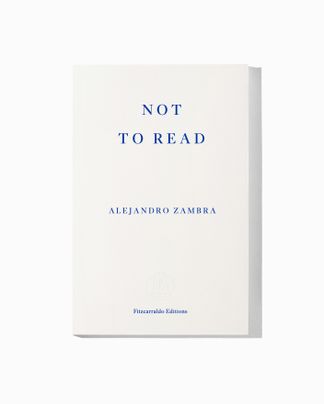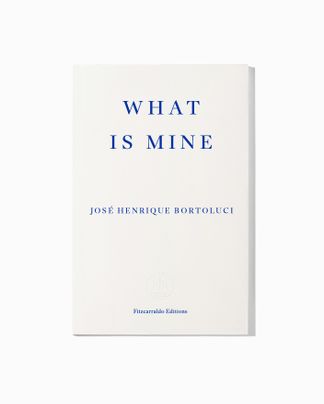Verónica is late, and Julián is increasingly convinced she won’t ever come home. To pass the time, he improvises a story about trees to coax his stepdaughter, Daniela, to sleep. He has made a life as a literature professor, developing a novel about a man tending to a bonsai tree on the weekends. He is a narrator, an architect, a chronicler of other people’s stories. But as the night stretches on before him, and the hours pass with no sign of Verónica, Julián finds himself caught up in the slipstream of the story of his life – of their lives together. What combination of desire and coincidence led them here, to this very night? What will the future – and possibly motherless – Daniela think of him and his stories? Why tell stories at all?
The Private Lives of Trees, Alejandro Zambra’s second novel, now published in the UK for the first time in a revised translation by Megan McDowell, overflows with his signature wit and his gift for crafting short novels that manage to contain whole worlds.

The Private Lives of Trees
Translated by Megan McDowell
French paperback with flaps, 88 pages
Published 7 February 2023
The Private Lives of Trees
Translated by Megan McDowell
I .
GREENHOUSE
¶ Julián lulls the little girl to sleep with ‘The Private Lives of Trees’, a series of stories he makes up to tell her at bedtime. The protagonists are a poplar tree and a baobab who, at night, when no one is watching, talk about photosynthesis, squirrels, or the many advantages of being trees and not people or animals or, as they put it, stupid hunks of cement.
Daniela is not his daughter, but it is hard for him not to think of her that way. It’s been three years since Julián joined the family. He was the one who came to them – Verónica and Daniela were already there. He married Verónica, and in some ways also Daniela, who was hesitant at first, but little by little began to accept her new life: Julián is uglier than my dad, but he’s nice, she would say to her friends, who nodded with surprising seriousness, even solemnity, as if they somehow just knew that Julián’s arrival was not an accident. As the months passed this stepfather even earned a place in the drawings Daniela made at school. There’s one in particular that Julián always keeps on display: the three of them are at the beach, Daniela and Verónica are making cakes out of sand, and he is dressed in jeans and a shirt, reading and smoking under a perfectly round and yellow sun.
Julián is uglier than Daniela’s father, but he’s also younger; he works more and makes less money; smokes more and drinks less; exercises less – doesn’t, in fact, exercise at all – and knows more about trees than about countries. He is lighter-skinned and less simple and more confused than Fernando – Fernando, that is Daniela’s father’s name. He must have a name, even if he isn’t, exactly, Julián’s enemy, or anyone else’s. Really, there is no enemy here. That is precisely the problem: in this story there are no enemies. Verónica has no enemies, Julián has no enemies, Fernando has no enemies, and Daniela, except for an impish little classmate who spends all his time making faces at her, has no enemies either.
Sometimes Fernando is a blot on Daniela’s life, but who isn’t, at times, a blot on someone else’s life.
Julián is Fernando without the blot, but sometimes Fernando is Julián without the blot. And then there’s Verónica, who is:
For now Verónica is someone who is not home, who isn’t back yet from her drawing class. Verónica is someone who is lightly absent from the blue room – the blue room is Daniela’s bedroom, and the white room is Verónica and Julián’s. There is, in addition, a green bedroom, which they call the guest room mostly in jest, since it wouldn’t be easy to sleep in that mess of books, folders and paintbrushes. The big trunk where they stored their summer clothes a few months back is set up as an uncomfortable sofa.
The final hours of a normal day have settled into an impeccable routine: Julián and Verónica leave the blue room when Daniela falls asleep, and then, in the guest room, Verónica draws and Julián reads. Every once in a while she interrupts him or he interrupts her, and these mutual interferences constitute dialogues, offhand conversations or sometimes important, decisive ones. Later they move to the white room, where they watch TV or make love or start to argue – nothing serious, nothing that can’t be fixed immediately, before the movie is over or when one of them gives up, wanting to sleep or have sex. Those fights usually end in a fast and silent screw, or maybe a long one replete with soft laughter and moans. Then come five or six hours of sleep. And then the next day begins.
But this is not a normal night, at least not yet. It’s still not completely certain that there will be a next day, since Verónica isn’t back yet from her drawing class. When she returns, the novel will end. But as long as she is gone, the book will continue. The book goes on until she returns, or until Julián is sure that she isn’t going to return. For now, Verónica is absent from the blue room, where Julián lulls the little girl to sleep with a story about the private lives of trees.
Right now, sheltered in the solitude of the park, the trees are commenting on the bad luck of an oak, in whose bark two people have carved their names as a symbol of their friendship. No one has the right to give you a tattoo without your consent, says the poplar, and the baobab is even more emphatic: The oak tree has been the victim of a deplorable act of vandalism. Those people deserve to be punished. I shall not rest until they get the punishment they deserve. I will travel the earth, sky, and sea to hunt them down.
Daniela laughs hard, without the faintest hint of sleepiness. And she urgently, anxiously asks the inevitable questions, never just one, always at least two or three: What’s vandalism, Julián? Can I have some lemonade, with three spoonfuls of sugar? Did you and my mum ever carve your names into a tree as a symbol of your friendship?
Julián answers patiently, trying to respect the order of the questions: Vandalism is what vandals do; vandals are people who do damage just for the joy of doing damage. And yes, you can have some lemonade. And no, your mum and I never carved our names into the bark of a tree.
(…)
The Arts Desk Books of the Year 2023 | Review31 Books of the Year 2023
‘The Private Lives of Trees is a small classic in Latin American letters – small in size but not in depth or reach. Books like this one remind us that the experience of reading can still be closely tied to our lives, and not a mere succession of minutes and phrases strung together by someone else’s mind.’
— Valeria Luiselli, author of Lost Children Archive
‘In The Private Lives of Trees, I found proof of what I had suspected all along that writing could offer us, beyond writing itself…. Finally, I’d found an author who was writing in order to reach that place not made of words. And he took you there with him. I know of no greater talent. Not in literature or in life.’
— Margarita García Robayo, author of Fish Soup
‘Original and funny, Zambra has a knack for treating serious ideas lightly. This kind of meandering, light-touch writing must present difficulties for a translator, but McDowell has gracefully overcome them. Like a bonsai tree, The Private Lives of Trees is small but artful.’
— Miranda France, Times Literary Supplement
‘A world that remains distinctively and compellingly his own is that of Alejandro Zambra in The Private Life of Trees, translated by Megan McDowell. One of the most inventive writers in the Spanish-speaking world, the Chilean author has developed a unique style that combines a puckish wit with a clear-eyed … view of the fears and hopes of his struggling writers.’
— Michael Cronin, Irish Times
‘One of the greatest literary events of recent years.’
— Alfonso Cortínez, Las Últimas Noticias
‘Julián is an exceptionally well-drawn character, his subdued eccentricity rendered sympathetically but honestly…. Zambra has proven here that he can do complex emotion as well as he can do cynicism.’
— The Rumpus
‘A fleeting story translated with care – worth savouring.’
— Kirkus Reviews
‘Despite the novel totaling only 86 pages, Zambra manages to enclose an entire world inside.’
— Ewa Połka, Buzz Magazine
‘This is an immensely tender work that is easily read, in fact optimally read, in one sitting. I haven’t read another book that meditates as roundly on huge, human questions in such a small body. Published for the first time in the UK this year, Zambra’s book was a much-needed jolt back into reading for the sake of it.’
— Lia Rockey, The Arts Desk Books of the Year
Alejandro Zambra was born in Santiago, Chile, in 1975. He is the author of Chilean Poet, Multiple Choice, Not to Read, My Documents, Ways of Going Home, The Private Lives of Trees and Bonsai. In Chile, among other honours, he has won the National Book Council Award for best novel three times. In English, he has won the English PEN Award and the PEN/O. Henry Prize and was a finalist for the Frank O’Connor International Short Story Award. In 2023 he won the Manuel Rojas Ibero-American Prize for the totality of his oeuvre. He has also won the Prince Claus Award (Holland) and received a Cullman Centre Fellowship from the New York Public Library. His books have been translated into twenty languages and his stories have been published in the New Yorker, New York Times Magazine, Paris Review, Granta, McSweeney’s Quarterly and Harper’s, among other publications. He has taught creative writing and Hispanic literature for fifteen years and currently lives in Mexico City.
Megan McDowell is an award-winning Spanish-language translator. She has translated books by Alejandro Zambra, Samanta Schweblin, Mariana Enríquez and Lina Meruane, among others, and her short story translations have appeared in the New Yorker, the Paris Review, Harper’s and The White Review. She lives in Santiago, Chile.




